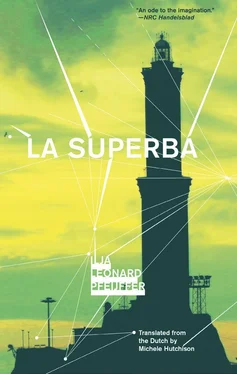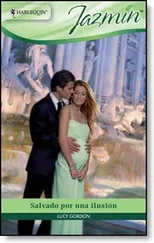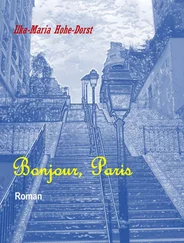By now I knew how it worked. I smoked a cigarette outside and waited patiently until a tramp came to sell me a ticket number. I knew the price. I was prepared to pay fifteen euros. But nobody came. After half an hour, I decided just to go inside. I reported to the counter to ask where I could get a number. The receptionist said it wasn’t possible. I asked whether that meant it was my turn. He said it wasn’t that simple and I needed special authorization. I said I had that. He shook his head. Practically no one had special authorization. And what’s more, it was the lunch break. If I’d come half an hour earlier he might have been able to help me.
“But then I’ll come after lunch.”
He sighed.
“What time…?”
“Half past three.”
In my home country, I only had to give the sign and an alderman would call me back. And in such cases, someone higher up would usually offer help, too. And after that the mayor or the minister would call just to make sure that everything had been satisfactorily settled and to make sure I wasn’t going to write a caustic item in the paper about it.
Here, it was with the greatest difficulty that I got to speak to a counter clerk. When I returned at three thirty, there was somebody else there. He refused to look up. I coughed. No reaction. I coughed importantly. He looked up. I produced my stamped document from City Hall on Via Garibaldi. He gave it a fleeting glance and then turned with admirable concentration to a very important, undoubtedly urgent, serious receptionist’s task that he had to carry out on his computer. I hit the counter as hard as I could with the flat of my hand. It made even me jump. It clearly happened fairly often during his responsibility-infused workdays. “If you’d like me to call security,” he sighed without looking up from his screen, “then I can be of service to you in the blink of an eye.”
“If I were you…” I began. I had to bluff my way through this. “If I were you, I’d at least have the courtesy to hear me out before I call someone. I’m a friend of Fulvia’s.”
It had popped out before I realized. I don’t know how I’d come up with it. But he reacted as though he’d been stung by a wasp. “Fulvia Granelli?” he asked.
“Granelli Fulvia,” I confirmed.
“My apologies, I thought you were a foreigner. Might I see that document again? And what have you come for if I might ask? Alright, alright, I understand. This is highly irregular. Fourteenth floor. You can take the lift at the end of the corridor on the right.”
I was met by a friendly older woman who introduced herself as the secretary to the alderman’s personal assistant. I was already beginning to climb the ladder. But the more she began to understand of the reason I was there, the unhappier she looked.
“But it would be impossible for me to give you that information,” she said with a pained look on her face which seemed to express genuine disappointment at the fact she couldn’t be of service to me.
“Why not?”
“Because it doesn’t exist.”
“But if you say it’s a matter of information you can’t give me, that means the information does exist.”
“That might be so, but I can’t give it to you.”
“Why not?”
“I just told you. Because it doesn’t exist.”
“How can it be possible for something to exist and not to exist simultaneously?”
“In Italy it’s very possible.”
“Everything exists in as much as it’s possible with the right contacts, and nothing exists in so far as nothing is possible without the right contacts.”
“You said it. I can neither confirm it nor deny it.”
“The Parodis.”
“They’re a powerful clan in Genoa. They’ve meant a lot to this city. Could I give you some advice?”
“Advice that does or doesn’t exist?”
“Then I won’t.”
“I understand what you want to say, but I’m not giving up. I want that information that doesn’t exist. Where should I go?”
“You could try the City Hall?” she said hopelessly.
“On Via Garibaldi?”
“Yes, City Hall.”
“Will I have to get a ticket again?”
“I can reserve a low number for you.” The relief in her voice was audible. “I can do that for you. I’d be happy to do that. Thank you. Might I be of further service to you with a scratch card perhaps?”
19.
The heat was relentless. The sun hung above the city like a vibrating copper gong. Its sound still echoed deafeningly along the alleyways. Salty sweat dripped from the gray walls. The pavement sighed under each sporadic sighing footstep. It was about to burst open. The pus from the swamp under the stones was searching for egress. The stench could already be smelled. Drunken Moroccans hung about on the street corners. It was too hot to mug anyone. Senegalese squatted in the shade of their run-down, overpopulated palazzi. It was too hot to pursue their war against the Moroccans. The sighing of all those afflicted hung like a clammy mist over the dark alleyways. This was the macaia , roaming the city like a ghost made of wet bed sheets.
It was, to cut to the chase, much too hot to wear a suit. When I’d put it on at home in front of the mirror, I’d been happy with it. It suited me, in as much as any clothes suit me. But once I was outside amid the half-naked tourists and copper girls in fluttering little nothings, it felt like a ridiculously over-the-top Mardi Gras costume in which I’d sweat to death, like someone wearing a lion suit on the beach, hopping around among the beachgoers for some ridiculous ad.
I’d arranged to meet Monia for an aperitif in the Bar of Mirrors. She wasn’t there yet. No doubt she wanted to make sure she arrived later than I so that she could make a grand entrance in her evening gown. And that’s what she did. And how. She came swirling around the corner in a gigantic bright yellow confection with a train and a wide, tall collar that fanned out behind her head, and which was so low-cut at the front that there was hardly anything of her scandalous breasts left to the imagination. I was really shocked when I saw her. It was all a bit too — which word should I use for it? — ostentatious. Yes, we were going to the opera and people were expected to dress up. But that doesn’t mean to say you should dress as though you were going on stage to perform the role of the Empress-whore of Babylon in the extravagant costume design of a director famous for his provocations. How could I in all decency show my face with a person like that? In my much-too-hot and much-too-expensive Mafia suit? The prospect was mortifying. What’s more, I noticed that she wasn’t entirely steady on her legs. But that might be due to the exorbitant high heels she was wearing.
She sat down at my table and ordered a Negroni. “Are you going to a masquerade ball?” the waitress asked. She could hardly control her giggles. Monia considered it all totally normal. She explained patiently that we were going to the opera and that her good friend Leonardo the poet was gallant enough to accompany her. I blushed, but luckily it wasn’t very noticeable as my face was already bright red from the heat.
I decided to strike while the iron was hot. I brought up the theater. I explained the situation at length to her. I described what it looked like and how wonderfully equipped it was. I gave her an in-depth account of the artistic and commercial potential. I dropped the words “exceptional opportunity” several times. I told her about our chat with Pierluigi Parodi and my attempts to shine a light on the agreement with the council. I asked her what she thought of all this. She gazed at me wide-eyed. But that didn’t mean anything. It was the way she always looked.
“But what do you think, Monia?”
Читать дальше












